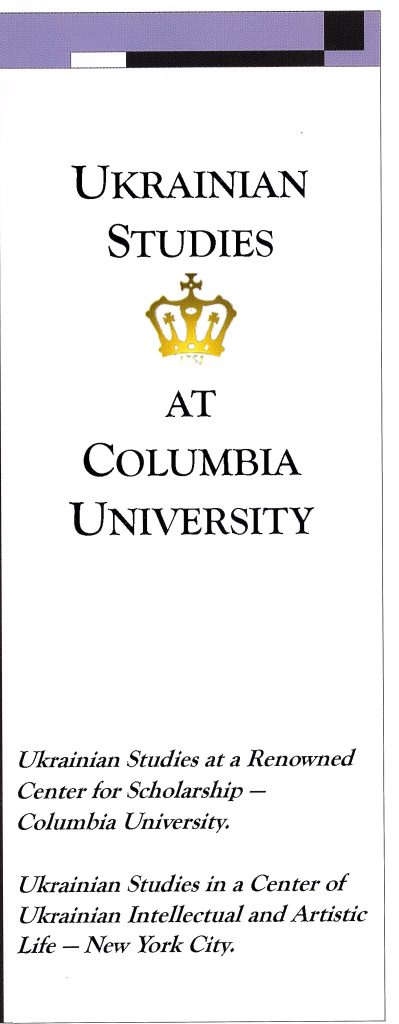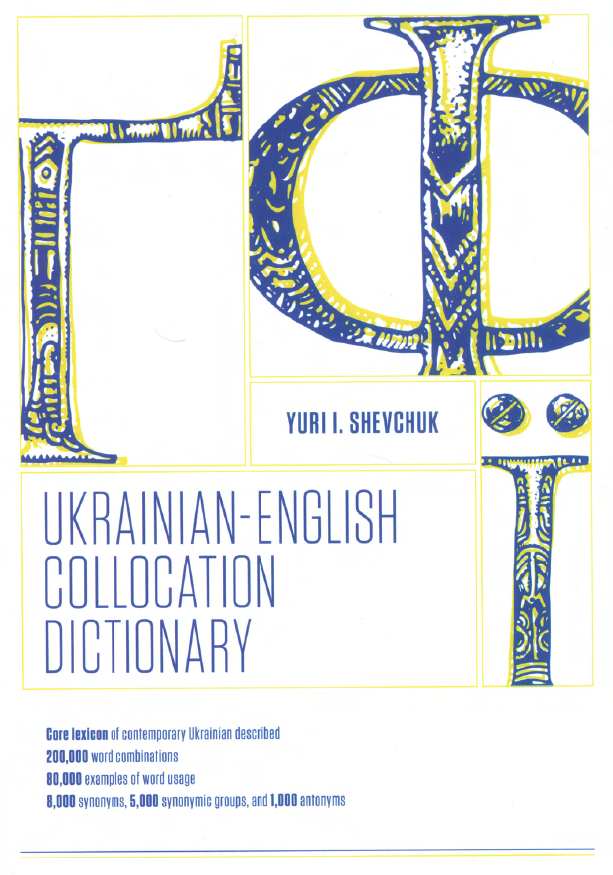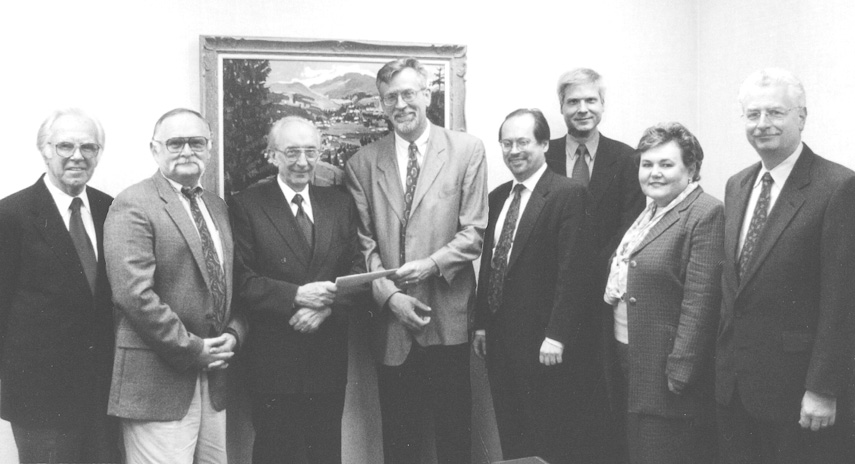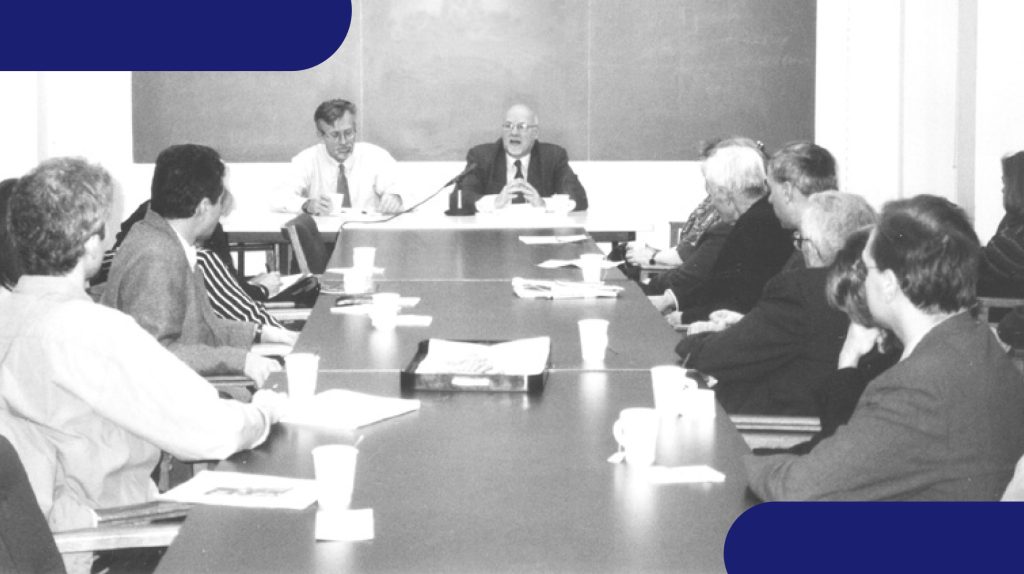The fundamental goal of the Ukrainian Studies Fund since its inception has been and remains the multi-faceted promotion of the study and dissemination of information about the cultural and historical heritage of the Ukrainian people. For this purpose, the USF — by uniting the Ukrainian community around this idea and securing appropriate financial support — created Ukrainian Studies chairs and programs at North American universities. In so doing, the USF implemented the resolution adopted during the III Congress of the Federation of Ukrainian Student Organizations of America in 1957, the year before the USF was established. These university departments and study programs were intended to become the forums from which academic information about Ukraine would spread. In addition, it was important to create a genuine counterweight to the Soviet “scholarship” of that time, which falsified the history of Ukraine and aimed to destroy the language and national consciousness of Ukrainians.
Columbia Project

By enabling the establishment of a center for Ukrainian Studies at Harvard University, the Ukrainian community in the United States gained necessary access to the world of academia and an authoritative scholarly legitimacy, without which academic discourse is impossible. As a result, this also laid the foundation for the further development of Ukrainian Studies in North America, which significantly increased the opportunities for disseminating information about Ukraine, both among the Ukrainian diaspora and more importantly in American academic and community settings. The choice of the next university as the location for a new center of Ukrainian Studies, after Harvard, fell upon Columbia University in New York City. This selection was based primarily on the fact that Columbia is equally one of the more important and influential American universities, and boasts a large number of students who study Eastern Europe, political science, journalism, business and diplomacy. For this reason, it is imperative, especially today, that a center of professional Ukrainian Studies at Columbia continue to evolve. Columbia University has a strong tradition of Slavic Studies and a solid library collection of Ukrainian books. Furthermore, such well-known scholars in the American community as Y. Shevelov, M. Yarymovych, I. Lysiak-Rudnytsky, V. Holubnychy, I. Ševčenko, S. Chemych, M. Labunka, M. Bohachevsky-Chomiak, Y. Pelensky, O. Danko, N. Sonevytska, Z. Sokhor, I. Koropeckyj, A. Procyk, M. Znayenko, F. Sysyn, W. Dushnyk, A. Karatnycky, G. Perfecky, Y. Tarnavsky, S. Sliuzar, P. Potichnyj, B. Vytvytsky, V. Chernetsky, O. Motyl and others taught and studied at Columbia University. In addition, a large Ukrainian community and Ukrainian academic institutions are consolidated in New York City, all of which have fostered a vibrant and productive social, academic and cultural environment for the development of Ukrainian Studies in this city.
The process of establishing a Ukrainian Studies program at Columbia began in 2002, but it should be noted that academic conferences about Ukraine, Ukrainian language courses, and the exchange of researchers from Ukraine were already being held at the university, on a regular basis, prior to 2002. Two endowed programs which currently exist at Columbia and provide assistance in the further development of the Ukrainian Studies program include The Peter Jacyk Endowed Fund at the Harriman Institute (founded in 1993) and the Volodymyr and Lydia Bazarkiv Scholarship Fund (founded in 1998).
The Harriman Institute, which engages in the research of the countries of Europe and Asia, and, in particular, modern Ukraine, had in the past employed such renown scholars as Dr. Zbigniew Brzezinski and Dr. Madeline Albright, both of whom went on to serve as U.S. National Security Adviser and U.S. Secretaries of State, respectively. Between 1989 and 2001, Prof. Mark von Hagen served as director of the Harriman Institute. Dr. Mark von Hagen was an outstanding American historian, professor of Russian, Ukrainian and Eurasian history at the University of Arizona, who, in addition to Columbia, had also taught at Stanford and Yale Universities, as well as at the Graduate School of Social Sciences in Paris. Furthermore, Professor von Hagen, under a joint appointment, also served as part-time Professor Emeritus of History and Global Studies in the School of History, Philosophy and Religious Studies and in the School of International Literature and Culture at the College of Liberal Arts and Sciences. In 2008, Professor von Hagen was elected President of the American Association for the Advancement of Slavic Studies (subsequently renamed the Association for Slavic, Eastern European, and Eurasian Studies) and served as dean of the Faculty of Philosophy at the Ukrainian Free University in Munich. According to the current director of the Harriman Institute, Prof. Valentina Izmirlieva, Prof. Mark von Hagen was a true visionary who transformed the Harriman Institute at a time when that region, which is being researched today, was undergoing radical changes after the collapse of the Soviet Union. Already by the mid-1990s, the political map of the former Soviet bloc was completely different, and Professor von Hagen clearly saw that the approach to teaching and exploring these new societies required certain changes, so that the research and educational methods would reflect the broader geopolitical and social transformations. Under the leadership of Prof. Mark von Hagen, the Harriman Institute had evolved from a structure focused only on one region or one country within the Soviet Union (and almost exclusively on Moscow) to a genuine institution of contemporary national-regional studies.
The Ukrainian language program at Columbia University is the leading program for teaching and researching the Ukrainian language in the United States. The academic foundation on which it relies is the legacy of Prof. Y. Shevelov, the most outstanding and distinguished authority on the Ukrainian language of the second half of the twentieth century, who taught at Columbia University in 1954-1977. The program is a recognized leader in the development of resources and pedagogy of the Ukrainian language and ensures proficiency in the Ukrainian language at all levels. As an integral component of Ukrainian Studies at Columbia, the language program conducts lectures on topical issues of Ukrainian language pedagogy at such academic forums as the American Association of Teachers of Slavic and Eastern European Languages, the Association for Slavic, Eastern European, and Eurasian Studies, the American Council for the Teaching of Foreign Languages, and the International Council for Central and Eastern European Studies. The program also collaborates productively with the National University of Kyiv-Mohyla Academy, the Ivan Franko National University of Lviv, the Ukrainian Catholic University (Ukraine), the University of Granada (Spain), etc. In recent years, Columbia’s Ukrainian Studies program has initiated academic cooperation with the Fulbright Program in Ukraine.
Since 2007, the administrator of the Ukrainian Studies Program at Columbia University has been Dr. Marko Andryczyk. During the spring semester of 2024, Dr. M. Andryczyk launched a new course called “Brand New: Creating Identity in Contemporary Ukrainian Culture.” At this critical time for Ukrainian Studies, Dr. Andryczyk also edited about the war in Ukraine titled “Ukraine 22: Ukrainian Writers Respond to War”, which was published in London in 2023. In 2022, Dr. Andryczyk also published an English translation of Volodymyr Rafayenko’s novel Mondegreen: Songs About Death and Love. Subsequently, this translation was awarded the “Peterson Literary Fund 2023 Translated Book Award,” as the best modern translation from Ukrainian. In October 2023, Dr. M. Andryczyk organized an academic conference titled “The Assault on Culture in Ukraine: The Holodomor Years,” co-sponsored by the Holodomor Research and Educational Consortium at the Canadian Institute of Ukrainian Studies in Edmonton. On the occasion of the tenth anniversary of the Revolution of Dignity, in December 2023, Dr. Andryczyk held a workshop titled “A Decade After the Euromaidan: Reflecting on Ukraine’s Revolution of Dignity and Its Ongoing Impact.”

As a professional linguist and experienced lecturer, Dr. Yuri Shevchuk has been teaching courses on Ukrainian language, language policy, Ukrainian culture and history of Ukrainian cinema at the Ukrainian Studies Program of Columbia University for 20 years. The list of Dr. Shevchuk’s courses includes: “Elementary Ukrainian I and II,” “Intermediate Ukrainian I and II,” “Advanced Ukrainian Through Literature, Media and Politics I and II” and “Soviet, Post-Soviet, Colonial and Post-colonial Cinema.”
Thanks to the so-called “Shared Course Initiative” program, students at Yale and Cornell universities have the opportunity to virtually enroll in Dr. Shevchuk’s Ukrainian language courses, and students from New York University, the New School for Social Research, and New York City University can enroll in Ukrainian language courses through the Inter-University Consortium Program. As a teacher, Dr. Shevchuk is also engaged in educational and publishing activities. In 2021, thanks to the generous support of the Ukrainian Studies Fund, Dr. Shevchuk’s ground-breaking lexicon was published, namely the “Ukrainian-English Collocations Dictionary”. The dictionary contains 200,000 word combinations, 80,000 illustrated examples, 8,000 synonyms, and over 1,000 antonyms. In March 2024, the second, revised edition of this unique dictionary was published, and in January 2023, Hippocrene Books, Inc. printed the second edition of the third edition of Dr. Yuri Shevchuk’s textbook “Beginner’s Ukrainian”.

The 2024-2025 academic year marks the twentieth anniversary of the Ukrainian Film Club of Columbia University. This is the only permanent forum for Ukrainian cinema in North America. Most of the films shown were documentaries about Russian aggression against Ukraine, including the films “Peaceful People”, “Cacophony of Donbas”, the environmental documentary “Return Sasyk to the Sea,” the war feature “Bucha”, the 18th-century historical feature “Dovbush” and others.
During the first two years of the full-scale Russian invasion of Ukraine, 33 courses in Ukrainian Studies were offered at Columbia, which were taught by visiting professors, researchers and lecturers, who enriched the Ukrainian Studies Program with their academic expertise and professional experience. Thus, the Ambassador of Ukraine to the United States, Valeriy Kuchynskyi, taught two courses on Ukrainian foreign policy and modern Ukrainian diplomacy, namely “Ukraine’s Foreign Policy: Russia, Europe and the US” and “Today’s Ukraine: Power Politics and Diplomacy”. Dr. Elise Giuliano ̶ Director of Graduate Studies at the Harriman Institute and Senior Lecturer in Political Science ̶ taught two courses and one seminar during the 2023-2024 academic year, namely, “Legacies of the Soviet Union and Empire”, “Ethnic Politics in Post-Soviet Eurasia” and “MA Thesis Seminar.” Dr. Myroslav Shkandrij (Professor Emeritus at the University of Manitoba in Winnipeg), as a visiting professor, taught two courses on the history of Ukraine during the fall semester in 2023, namely “Ukraine and Empire” and “Ukraine in World War II”. In 2023, with the financial assistance of the Ukrainian Studies Fund, Prof. M. Shkandrij published an historical monograph on the Galician Division titled “In The Maelstrom: The Waffen-SS ‘Galicia’ Division and its Legacy.” Visiting Professor Volodymyr Kulyk taught two courses on Ukrainian politics during the spring semester in 2024, namely “Politics and Society in Ukraine” and “Politics of Identity in Post-Communist East Central Europe”. In addition, Prof. Kulyk was invited to three separate universities to present lectures on identity and language issues in relation to the current war in Ukraine at Northwestern University near Chicago, at the University of Florida, and at the University of Wisconsin-Madison. Dr. Emma Mateo, an Ukrainian Studies stipendist of the Petro Jacyk Education Foundation, spent her post-doctoral fellowship during the 2022-2023 and 2023-2024 academic years as a resident lecturer and researcher at Columbia University. For two semesters, Dr. Mateo taught the sociology course “Ukrainian Activism and Protest Since 1990”. During her two-year fellowship residency at Columbia University, Dr. Mateo also engaged in field research in Ukraine, where she visited Kyiv, Chernihiv, and Dnipro for four weeks in the summer of 2023 to conduct interviews with 35 community activists. Dr. Mateo plans to use this collected material for a future monograph on civic activism during the current war in Ukraine.
The Department of Slavic Studies at Columbia University contains one of the largest Slavic-language university library collections in North America, totaling 545,290 library units under the OCLC WorldCat cataloging system. According to Robert H. Davis, Jr., Chief Librarian for Russian, Eurasian and East European Studies at Columbia University, Ukrainian-language content comprises 19% of the entire Slavic collection.
